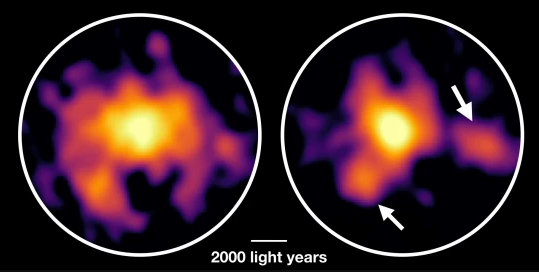A group of scientists captured a stunning image of a distant galaxy, reminding us all how insignificant we are in the great scheme of things.
This 'monster galaxy' is approximately 12 billion light-years from Earth and generates new stars 1,000 times faster than our own Milky Way galaxy.
Scientists used the £1.1 billion ALMA Observatory in Chile to capture pictures of the galaxy with 10 times the resolution of any previous attempt, dubbed 'COSMOS-AzTEC-1.'
The observations revealed previously unknown details about the structure of this starburst galaxy, considered to have formed in the first billion years after the big bang.
'We discovered two different huge clouds many thousand light-years away from the centre,' said Ken-ichi Tadaki of Japan's National Astronomical Observatory, which collaborated with the University of Massachusetts Amherst to make the observations.
That is a huge accomplishment
Monster galaxies, also known as starburst galaxies, are assumed to be the origins of today's enormous galaxies like the Milky Way.
The Milky Way galaxy is made up of a single, compact core with spiral arms stretching outwards. COSMOS-AzTEC-1, on the other hand, contains three cores - or two smaller cores separated by light-years.
‘In most distant starburst galaxies, stars are actively formed in the centre. So it is surprising to find off-centre clouds,’ Tadaki said.
This galaxy appears to be very unstable in comparison to other galaxies.
According to the researchers, the huge cloud of gas in the galaxy exerts too much pressure on the centre, which the outward spin cannot compensate for. In a typical galaxy, gravity pushing inwards and pressure pushing outwards are balanced. This one, on the other hand, is going through a massive gravitational collapse, which is most likely what is causing its rapid star formation.
The entire gigantic galaxy, according to the researchers, will disintegrate in about 100 million years. However, they have yet to explain how it became so enormous in the first place.
Reference(s): Metro















No comments